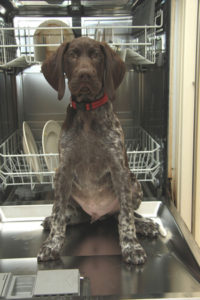At my 10-year-old dog’s last routine physical examination, her veterinarian, Dr. Howard Gittleman uncovered a potentially alarming condition in this otherwise happy, tail-wagging dog. Rye’s heart showed an alarming beating pattern.
An exact interpretation of the symptom (premature contractions of her heart’s ventricle) was not straightforward. I was told that such atypical contractions were sometimes part of the normal aging process. The heartbeat issue could also be a sign of systemic cancer or a problem that could result in acute death. There was no way to be sure. X-rays of Rye’s chest and an ultrasound of her heart and abdomen were ideally required to know more about her condition and the estimate of costs were high, at least for me, a self-employed worker.
Watching Your Pet Age is Hard
Everyone who owns an aging pet understands my anxiety. Over the years, I have watched my beautiful, sleek, bounding puppy turn into a senior animal; one that sleeps later and more often; one that struggles with arthritis when she stands up or lies down; one who doesn’t seem to see, smell or hear as well as she used to. Each night when I hold her, I think…’how much longer do we have together, Rye?’
So I agreed to the tests. The care was superlative and the depth of the medical expertise was impressive. The more I take my dog to the veterinarian the more I wish my own healthcare were as good. My monthly health insurance charge is considerably more than the bill for an entire year’s worth of healthcare for my dog, and honestly, I think the dog has the better deal.
Good News Your Pet Has…
The chest radiographs, the ultrasound of the heart and abdomen…even a subsequent 24 heart monitor all confirmed that Rye had a noteworthy premature contraction in her ventricle, but none revealed what, if anything, should be done about it. The only answer that we were left with was, ‘we’ll continue to watch and see’.
What’s the Point of Preventative Care?
I ask myself whether or not it had been wise to spend the money on additional diagnostic tests that resulted in little more than a question mark. What if I had told Dr. Gittelman at that very first visit, ‘Nah, I’ll skip the tests. She’s old. I’d rather not know.’
But the truth is we got more than a question mark. We got, ‘your dog has a heart issue and we’re going to keep an eye on it to ensure sure she stays well’. I’m glad my dog’s vet is proactively addressing my old dog’s health. I know that inevitably, I’m going to have to face the death of this beautiful dog, but I have confidence that her vet will be on top of changes in her wellbeing and be on hand to keep her pain free and living healthy as long as he can.
That’s worth a lot. Anyone who has watched one of their pets age, weaken and die understands that the anxiety can be debilitating if not overwhelming, but it’s made worse if you and your pet experience it without understanding what’s really going on or without having anyone on hand, like a Dr. Gittelman, to get you through it.
Listen to veterinarian Fred Metzger explain why preventative senior healthcare is valuable.
Affordable Preventative Pet Healthcare is Available
Since Rye’s visit, I have explored ways to save for my dog’s future health needs. I applied and was approved for something called CareCredit, a credit card that allows me to pay off my veterinary bills (and some of my own healthcare bills!) over time without interest. I also explored some great pet insurance policies currently on the market, Trupanion, Nationwide and Pet Plan. In addition to these payment options, I was told that Animal Medical of New City offers third-party-managed payment plans that are also very affordable.
For more information on ways to pay for your pet’s healthcare needs, please check out the following resource. I hope this was helpful.
Rye enjoys her waning years slopping around in the woods thanks to the care she receives at Animal Medical of New City

